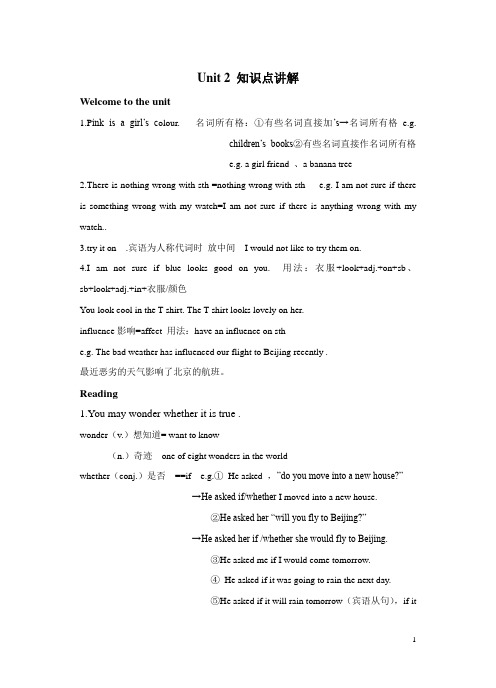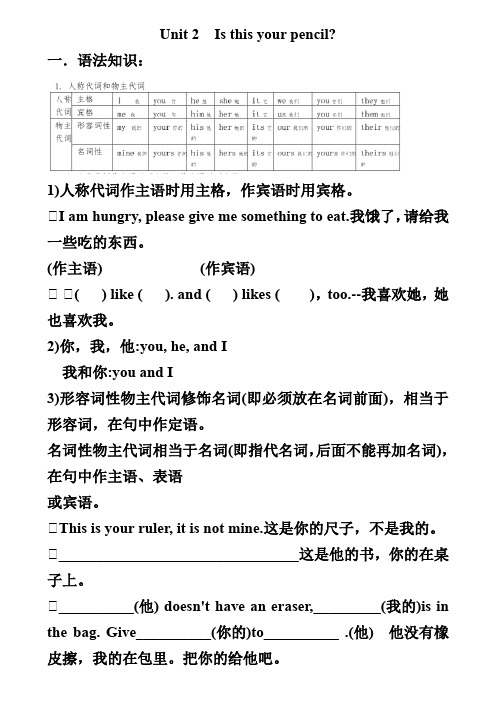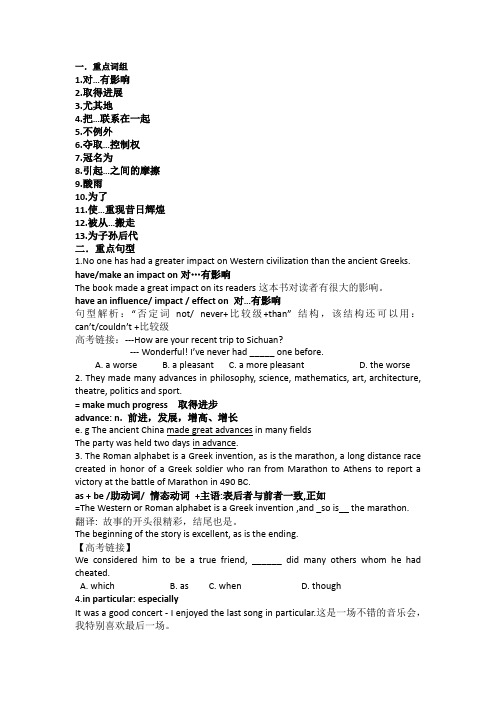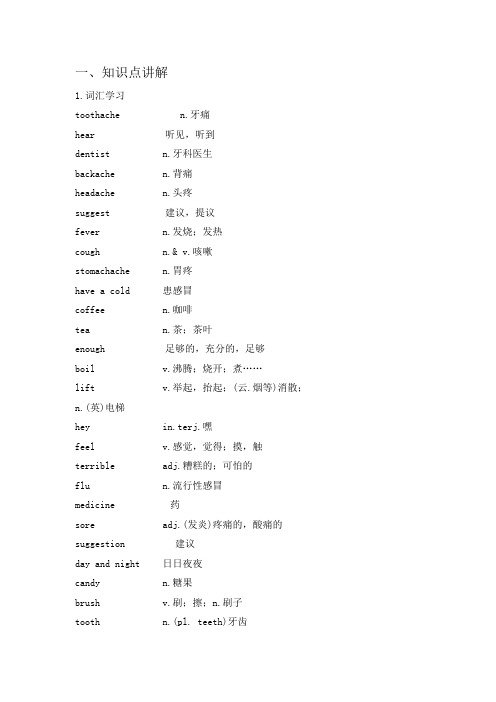Unit 2 知识点讲解
上海牛津版七年级上册unit2知识点讲解

上海牛津版七年级上册unit2知识点讲解一、知识点词汇精析要点梳理【1】daily adj. occurring or done each day 日常的adv.gradually and progressively 每日He needs daily exercise. 他需要天天运动。
The Visitor Centre is open daily from 8:30 a.m. to 4:30 p.m.游客中心每天上午8:30至下午4:30 开放。
【同根词】day n. 日子;白天【拓展】daily 作形容词时,相当于everyday; 作副词时,相当于every day。
Let’s begin with daily/everyday English. 让我们从日常英语开始吧。
I receive at least 3 emails daily/every day. 我每天至少收到三封邮件。
【应用】( )I go to school on foot ______.A.everydayB.all dayC.daily【2】love v. have a great affection or liking for somebody or something 喜爱n. a strong positive emotion of regard and affection 喜爱(1)love后面接动词时,既可以接动词不定式(to do),也可以接动名词形式(doing)。
一般这两种情况可以互换,但love to do常表示某一次或偶然的喜欢;而love doing则表示习惯性、经常性的喜欢。
I love to go to school.=I love going to school. 我喜欢上学。
(2)love后面也可以直接接名词。
I love basketball. 我喜欢篮球。
【同根词】lovely adj. 可爱的lover n. 爱好者;爱人loving 爱的;充满爱的【应用】( )She loves ______ the guitar very much.A.playB.playingC.plays【3】seldom adv. not often 很少;不常I seldom go to the cinema. 我很少去看电影。
Unit Two 知识点讲解

Unit 2 知识点讲解Welcome to the unit1.P ink is a girl‟s c olour. 名词所有格:①有些名词直接加‟s→名词所有格 e.g.children‟s books②有些名词直接作名词所有格e.g. a girl friend 、a banana tree2.There is nothing wrong with sth =nothing wrong with sth e.g. I am not sure if there is something wrong with my watch=I am not sure if there is anything wrong with my watch..3.try it on .宾语为人称代词时放中间I would not like to try them on.4.I am not sure if blue looks good on you. 用法:衣服+look+adj.+on+sb、sb+look+adj.+in+衣服/颜色You look cool in the T-shirt. The T-shirt looks lovely on her.influence影响=affect 用法:have an influence on sthe.g. The bad weather has influenced our flight to Beijing recently .最近恶劣的天气影响了北京的航班。
Reading1.You may wonder whether it is true .wonder(v.)想知道= want to know(n.)奇迹one of eight wonders in the worldwhether(conj.)是否==if e.g.①He asked ,”do you move into a new house?”→He asked if/whether I moved into a new house.②He asked her “will you fly to Beijing?”→He asked her if /whether she would fly to Beijing.③He asked me if I would come tomorrow.④He asked if it was going to rain the next day.⑤He asked if it will rain tomorrow(宾语从句),if itrains tomorrow(状语从句),he won‟t go.注意:如果,从句中有or not 连词,只能用whether …or not,不用if 。
Unit 2单元复习知识点 人教新目标英语七年级上册

Unit 2 Is this your pencil?一.语法知识:1)人称代词作主语时用主格,作宾语时用宾格。
①I am hungry, please give me something to eat.我饿了,请给我一些吃的东西。
(作主语) (作宾语)① ①( ) like ( ). and ( ) likes ( ),too.--我喜欢她,她也喜欢我。
2)你,我,他:you, he, and I我和你:you and I3)形容词性物主代词修饰名词(即必须放在名词前面),相当于形容词,在句中作定语。
名词性物主代词相当于名词(即指代名词,后面不能再加名词),在句中作主语、表语或宾语。
①This is your ruler, it is not mine.这是你的尺子,不是我的。
①________________________________这是他的书,你的在桌子上。
①__________(他) doesn't have an eraser,_________(我的)is in the bag. Give__________(你的)to__________ .(他) 他没有橡皮擦,我的在包里。
把你的给他吧。
2.Is this/that..,?这/那是...... 吗?Yes, it is. / No, it isn’t.是的,这/那(它)是。
/不,这/那(它)不是。
①回答时,要用it来代替this和that。
Is this/that your ruler? Yes, it is. /No, it isn’t.不可回答Yes, this/that is, / No, this/that isn't.3. Excuse me.请原谅/打扰了(客套语,用于问别人问题、请别人帮忙、打断别人说话等场合。
)Sorry/I’m sorry.“对不起,抱歉”(用于向别人表示歉意)A: Excuse me. Where is my pen?打扰了,我的钢笔在那?B: Sorry/I'm sorry. I don’t know.对不起,我不知道。
人教版八年级英语上册Unit 2重要知识点讲解

Unit2How often do you exercie?重要知识点讲解惯用法:1. help sb. with sth 帮助某人做某事2. How about…? ….怎么样?/ ….好不好?3. want sb. to do sth. 想让某人做某事4. How many + 可数名词复数+ 一般疑问句….有多少…..5. 主语+ find+ that 从句…发现…6. It’s + adj.+ to do sth. 做某事是….的7. spend time with sb. 和某人一起度过时光8. ask sb. about sth. 向某人询问某事9. by doing sth. 通过做某事10. What’s your favorite…..? 你最喜欢的……是什么?11 start doing sth. 开始做某事12. the best way to do sth.做某事的最好方式词语辨析:1. how often 多久一次,用来提问动作发生的频率。
回答用:once,twice, three times 等词语。
How often do you play sports? Three times a week.how long 多长,用来询问多长时间,也可询问某物有多长。
How long does it take to get to Shanghai from here? How long is the ruler?how for 多远,用来询问距离,指路程的远近。
How far is it from here to the park? It’s about 2 ki lometers.2.free 空闲的,有空的,反义词为busy.be free 有空,闲着,相当于have time.I’ll be free next week. = I’ll have time next week.还可作“免费的、自由的”解。
Unit2-how-often-do-you-exercise知识点讲解和练习

Unit2 how often do you exercise一、同步知识梳理重点单词1.家务事2.几乎不3.曾经4.一次5.两次6.因特网7. 节目8.满的)9.秋千 10.大概 11.最小12.咖啡13.健康 14.结果 15.百分之..16.在线17.电视节目 18.即使 19.穿过20.头脑21.身体 22.这样的 23.在一起24.死亡25.作家 26.牙科医生 27.杂志28.然而29.比 30.几乎 31.毫无32.较小 33.得分?重点词组1.2.几乎不 2.摇摆舞3.至少4.垃圾食品5.例如6.多于7.少于重点句型1.What do you usually do on weekends;I always exercise.2.What does she do on weekendsShe sometimes goes shopping.3.How often do you you go to the moviesI go to movies maybe once a month.Section Aoften do you exercise 你多久做一次运动—【解析1】how often/ how long / how far/ how soon辨析》【解析2】exercise v 锻炼=do sports= play sports【短语】take /have/do exercise 做运动 do morning exercise 做早操 do eye exercise 做眼保健操2.3.What do you usually do on weekends 你在周末做什么【解析1】频度副词【注】:频度副词表示多长时间做某事一次, 用在实义动词之前,系动词、助动词、情态动词之后。
We often clean the classroom every day. 【拓展】some time /sometime/some times/sometimes 【口诀】:分开是一段,合起是某时; 分开s 是倍次,合起s 是某时 (1)some time 一段时间,做时间状语 ;It takes sb. some time to do sth. 做某事花费某人多长时间(2)(3)sometime adv. 在某个时候,I hope to visit the USA _____ in the future.A. sometimesB. some timesC. sometime D . some time(3) some times 名词词组,“几次,几倍” sometimes=at times 有时 (一般现在时的标志词) 【解析2】weekend/weekday 辨析 【解析】on weekends = on Saturday and Sunday 在周末on weekdays= from Monday to Friday 在工作日3. Hardly ever 几乎从不【解析】hard (1)adv 努力地,猛烈地work hard 努力工作study hard 努力学习:(2) adj. 困难的,艰难的=difficult◆It’s hard/difficult for sb. to do sth. 做某事对某人来说是困难的It’s hard for us ____________(finish) the work without other ’s help.【拓展】hardly adv “几乎不,从来不”,表否定意义,常与can ,any ,ever 连用。
模块9unit2知识点讲解

一.重点词组1.对…有影响2.取得进展3.尤其地4.把…联系在一起5.不例外6.夺取…控制权7.冠名为8.引起…之间的摩擦9.酸雨10.为了11.使…重现昔日辉煌12.被从…搬走13.为子孙后代二.重点句型1.No one has had a greater impact on Western civilization than the ancient Greeks. have/make an impact on对…有影响The book made a great impact on its readers这本书对读者有很大的影响。
have an influence/ impact / effect on 对…有影响句型解析:“否定词not/ never+比较级+than”结构,该结构还可以用:can’t/couldn’t +比较级高考链接:---How are your recent trip to Sichuan?--- Wonderful! I’ve never had _____ one before.A. a worseB. a pleasantC. a more pleasantD. the worse2. They made many advances in philosophy, science, mathematics, art, architecture, theatre, politics and sport.= make much progress 取得进步advance: n. 前进,发展,增高、增长e. g The ancient China made great advances in many fieldsThe party was held two days in advance.3. The Roman alphabet is a Greek invention, as is the marathon, a long distance race created in honor of a Greek soldier who ran from Marathon to Athens to report a victory at the battle of Marathon in 490 BC.as + be /助动词/ 情态动词+主语:表后者与前者一致,正如=The Western or Roman alphabet is a Greek invention ,and _so is__ the marathon.翻译: 故事的开头很精彩,结尾也是。
仁爱英语2013年湘教版第二单元unit 2 topic 1 section A B 课文知识点分析

一、知识点讲解1.词汇学习toothache n.牙痛hear 听见,听到dentist n.牙科医生backache n.背痛headache n.头疼suggest 建议,提议fever n.发烧;发热cough n.& v.咳嗽stomachache n.胃疼have a cold 患感冒coffee n.咖啡tea n.茶;茶叶enough 足够的,充分的,足够boil v.沸腾;烧开;煮……lift v.举起,抬起;(云.烟等)消散;n.(英)电梯hey in.terj.嘿feel v.感觉,觉得;摸,触terrible adj.糟糕的;可怕的flu n.流行性感冒medicine 药sore adj.(发炎)疼痛的,酸痛的suggestion 建议day and night 日日夜夜candy n.糖果brush v.刷;擦;n.刷子tooth n.(pl. teeth)牙齿lie 躺,平躺lie down 躺下1.重点句型1. You should see a dentist. should/shouldn’t 应该/不应该2. —I have a headache. —You should stay in bed and have a good sleep.3. —I have a fever. —You should drink enough boiled water.4. —I can’t sleep well at night. —You shouldn’t drink coffee or tea in the evening.5. —I have a backache. —You shouldn’t lift heavy things.6. You shouldn’t read in the sun.7. He should see a doctor.8. You shouldn’t eat too m uch.2.课文呈现Betty: Hello, Kangkang! You don’t look well. What’s wrong with you? Kangkang: I have a toothache.Betty: I am sorry to hear that. You should see a dentist. Kangkang: I think I will.Betty: I hope you will get well soon.Kangkang: Thank you.3.课文知识点讲解1. What’s wrong with you? 你怎么了?类似的说法还有:what’s the trouble? What’s the matter with you? Is there anything wrong with…?等。
Unit2知识点讲解人教版英语七年级下册

1.英语钟点时刻的表达在英语中,钟点时刻的表达除了用阿拉伯数字(如8:10,12:45)外,还可以用以下几种表达方式。
◆当时间是整点时,可用“钟点数+o'clock”来表达,其中o'clock可以省略。
如:6:00 → six (o'clock) 11:00 → eleven (o'clock)◆当时间不是整点时,表达方式有以下两种:1. 钟点数+分钟数。
如:9:08 → nine eight 14:40 → fourteen forty2. 分钟数+ past / to +钟点数1) 当分钟数小于30时,用“分钟数+ past +钟点数”表示“几点过几分”。
如:8:09 → nine past eight7:25 → twentyfive past seven2) 当分钟数大于30时,用“(60-分钟数) + to +下一个钟点数”表示“差几分到几点”。
如:11:40 → twenty to twelve 2:58 → two to three注意:在分钟数中,15分钟还可以用a quarter表示,30分钟还可以用half来表示。
如:11:15 → a quarter past eleven8:45 → a quarter to nine13:30 → half past thirteen◆ A.M.(a.m.)和P.M.(p.m.)在12小时制中,我们可以用A.M.(a.m.)和P.M.(p.m.)来区分上、下半天。
A.M.(a.m.)意为“午前、上午”; P.M.(p.m.)意为“午后、下午”。
如:早上六点半→ 6:30 a.m. / half past six in the morning中午十二点→ 12:00 p.m. / 12 o'clock in the daytime午夜十二点→ 12:00 a.m. / 12 o'clock at night / at midnight【运用】用两种方式写出下列时间的英语表达1. 2. 3.___________________ 或___________________ ___________________或______________________________________或___________________参考答案1. four thirty; half past four2. eleven five; five past eleven3. nine fifteen; a quarter past nine2. what time & when 引导的特殊疑问句what time和when均可对时间状语进行提问,用来询问什么时间。
- 1、下载文档前请自行甄别文档内容的完整性,平台不提供额外的编辑、内容补充、找答案等附加服务。
- 2、"仅部分预览"的文档,不可在线预览部分如存在完整性等问题,可反馈申请退款(可完整预览的文档不适用该条件!)。
- 3、如文档侵犯您的权益,请联系客服反馈,我们会尽快为您处理(人工客服工作时间:9:00-18:30)。
Unit 2 知识点讲解词汇:puzzle【观察】请同学们观察下列句子,看看puzzle在句中用法有什么不同。
1. I’m in a puzzle as to how to deal with the new situation.我不知道该如何应付新局面。
2. I know nothing about her plan; it’s a puzzle to me.她的计划对我来说是个谜,我对此一无所知。
3. Soon my brother got stuck in the crossword puzzle.在拼写这个纵横字谜时,我弟弟很快被卡住了。
4. What puzzles me is why they didn’t turn up at the wedding.令我百思不解的是他们为什么没有出现在婚礼上。
5. She listened with a puzzled expression on her face.她脸上带着困惑的表情在倾听着。
6. The teacher’s explanation threw light upon the puzzling proble m.老师的说明使大家明白了这个让人困惑的问题。
【小结】puzzle作名词用时,可表示“困惑;谜;字谜;难题”等意义。
如句1、2、3。
puzzle也常用作及物动词,意思是“使困惑;使为难”。
puzzling和puzzled分别用作形容词,其中前者多修饰物,表示“令人困惑的”;后者常修饰人,意思是“(某人)感到困惑的”。
注意:当修饰人的表情、眼神、眼泪、微笑、叫声等时,常用puzzled。
如句4、5、6。
【练习】用puzzle的适当形式填空。
1. The _____ look on his face suggested that the problem was hard to solve.2. I wrote him last month and it is _____ that he hasn’t answered my letter so far.3. The meaning of the ancient Chinese poem has always been a _____ to me.4. What _____ me is why J.K. Rowling’s novels are so popular with teenagers. Keys:1. puzzled2. puzzling3. puzzle4. puzzlesvariousvarious adj. 各种各样的;不同种类的【例句】Tourists have various things to see and do in the theme park.在主题公园里,游客可看各种各样的东西,做各种各样的事。
For various reasons, he didn’t accept her invitation to her birthday party.由于各种原因,他没有接受她的邀请,参加她的生日聚会。
【拓展】1. vary v. 改变;变化;变更;使多样化;vary from ... to ...从……到……不等,在……到……之间变动;vary with ... 随……而变化。
2. variety n. 变化;种类;多样性;a variety of = varieties of = various多种多样的。
3. varied adj. 多种多样的,通常可与various通用,但varied带有“多变的;可变化的”意思。
【练习】从vary,variety,various和varied中选择合适的词填空。
1. The government has taken a _____ of measures to stop air pollution.2. The school library provides us students with wide _____ of books.3. As in China, the climate in Canada _____ from area to area.4. Before he retired last month, Mr. Black had enjoyed a long and _____ career.5. He has collected a large number of coins of _____ shapes and colors.Keys:1. variety2. varieties3. varies4. varied5. various / variedarise【观察】阅读下列句子,注意arise在句中的不同意思,并在a-e中找出与之对应的释义。
1. Heavy smoke arises when the coal is burned.2. Unexpected difficulties arose in the course of their experiment.3. The audience arose and applauded warmly at the end of the concert.4. He arose at six that morning, half an hour earlier than usual.5. The report shows that traffic accidents often arise from careless driving.【释义】a. stand up; rise to one’s feet 起立;站起来b. come into being; begin to happen 兴起;出现;发生c. to move upward; to go up 升起;上升d. to wake up and get up 起床e. to result; be caused or started by something产生;引起;造成Keys 1-c 2-b 3-a 4-d 5-e【辨析】rise; raise与arisearise (arose; arisen) 为不及物动词,多指“(问题、困难等)产生,出现”,也可指“起来,起身”等。
rise (rose; risen) 为不及物动词,作“上升,升起”讲,也可指“起身,起立,起床,上涨”等含义。
raise为及物动词,根本含义是“使上升”,它也有“举起,提出,抚养,筹集”等意思。
【练习】从rise, raise和arise中选择合适的词,并用其适当形式填空。
1. The doctors said that her illness _____ from lack of rest.2. He _____ his voice, hoping to make himself heard by all people present.3. The sun _____ in the east and sets in the west.4. She has made a lot of money by _____ pigs these years.5. Do you have any idea how the quarrel between them _____?1. arose2. raised3. rises4. raising5. arose短语:apart from【观察】阅读下列两组句子,注意观察其中apart from的意义有什么不同。
1. A. Apart from being too large, the c olor of the dress doesn’t suit me.这裙子除了太大,颜色我穿也不合适。
B. Apart from John and Mary, ten other students in our class have seen the film.除了约翰和玛丽,我们班还有10位同学看过这部电影。
2. A. It is a well-written composition, apart from some spelling mistakes.撇开一些拼写错误来说,这篇作文写得很好。
B. I like the dress very much apart from the color. It is a bit too bright.这裙子我很喜欢,只是颜色太鲜艳了。
【小结】通过观察以上两组句子,我们可以看出apart from是短语介词,后接名词、代词、动词-ing形式等作宾语,构成介词短语。
apart from兼有“除外”和“包括”双重意义:第一组句子中,apart from表示“此外,除……之外(还有)”,相当于besides,as well as,in addition to。
第二组句子中,apart from表示“撇开……来说,除了……之外”,相当于except for。
【练习】将下列句子译成汉语。
1. Apart from being fun and good exercise, swimming is a very useful skill.2. Apart from a few words, I do not know any Italian at all.3. Apart from “angry” and “hungry”, what other common English words end in “-gry”?1. 游泳除了有趣和是很好的锻炼外,也是一门有用的技能。
2. 除了几个单词外,我对意大利语一窍不通。
3. 除了angry和hungry, 还有哪些英文常见单词以-gry结尾?refer to◆ refer to常用来表示“谈到;提到;涉及到”。
如:1. The student referred to his father three times in his composition.该同学在作文里三次提到他父亲。
2. The book referred to his past experience as a teacher.书中涉及到他以前当老师的经历。
◆ refer to也有“参考;查阅”等含义。
如:1. He referred to his notebook now and then when giving his speech.他在发表演讲时不时翻看笔记本。
2. Don’t refer to the dictionary ev ery time you come across a new word.不要一遇到生词就查词典。
